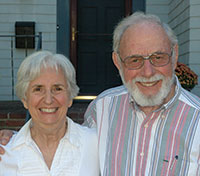Corrections Corner / Teresa and Bernie Batto
The good, the unrepentant, and the struggling
 (Editor’s note: The names used in this column have been changed to protect individuals’ privacy.)
(Editor’s note: The names used in this column have been changed to protect individuals’ privacy.)
They come in all stripes—not so much “the good, the bad, and the ugly,” as in the 1966 Western. They may be more accurately categorized as “the good, the unrepentant, and the struggling.” We are talking about the many inmates we have encountered in our many years of prison visitations and ministry.
Certainly there are the unrepentant, who appear incapable of acknowledging the enormity of their crimes, convicted criminals like “Toby” who knowingly helped arrange a premeditated murder, and “Mason” who lies about his long history as a drug dealer. There is also “Reginald,” who flatters himself as being both a genius and as evil as Satan. They truly belong behind bars.
At the other end of the spectrum are the repentant, those who not only acknowledge their past errors but have undergone radical conversions, both religiously and socially.
“Jonathan” is a prime example. Years earlier he abused a child. In prison, he underwent a profound conversion, so much so that he became a trusted mentor for other inmates in self-help programs and a leader in our Catholic prayer group. Similarly, “Manuel,” who was so moved by our stories of impoverishment in the Philippines that he decided on his own to contribute monthly from his meager prison earnings to help support a poor Filipino family.
“David” is another example. When we first met him, he was angry and bitter, wanting nothing to do with the Church. Through time, with gentle and kind prodding from a concerned Benedictine priest and fellow Catholic inmates like Jonathan, David softened and eventually was received into the Church in prison at the hands of then-Archbishop Joseph
W. Tobin. These are men for whom continued incarceration serves no useful purpose; they could be released and returned to society where they might utilize their energy and talents improving the community.
Which is exactly the case with David. Not only is he is out today and gainfully employed, he is very active in his home parish. Moreover, he is initiating a project that will help other men make a successful transition from prison back into society.
By far, the majority of inmates to whom we minister fall somewhere in between these two extremes. They are “the struggling”—those desirous of turning their lives around yet prone to relapse by long-standing habits of the past.
We think of “Ruben” who has been in and out of prison several times. Ruben is a college-educated, talented musician. Indeed, our prison worship services have benefitted tremendously from his many contributions. But he just can’t seem to overcome his addiction for money. He is not violent, but each time he has been released from prison, he soon ends back inside for some petty theft.
Neglect by parents and a quick temper landed “Larry” in prison for assault and battery. The desire to control his anger is partially responsible for bringing Larry into our Catholic group. Minus the bouts with anger, Larry is one of the nicest, most considerate persons you will ever meet.
It is the transformation that we have witnessed in so many that sustains us in this ministry. Jesus spoke of the great joy in heaven over just one repentant sinner. A similar joy spills over onto us here below. We pray that many more will join in this most rewarding ministry.
(Teresa and Bernie Batto are members of the archdiocesan Corrections Advisory Committee and are members of St. Paul the Apostle Parish in Greencastle.) †
 (Editor’s note: The names used in this column have been changed to protect individuals’ privacy.)
(Editor’s note: The names used in this column have been changed to protect individuals’ privacy.)